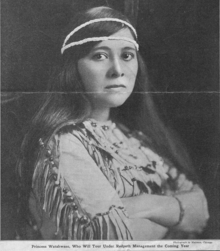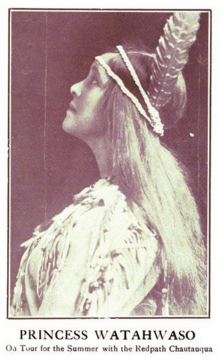Lucy Nicolar Poolaw


Lucy Nicolar Poolaw June 22, 1882 — March 27, 1969), also called Wa-Tah-Wa-So and billed as Princess Watahwaso, was a Penobscot and a performer on the Chautauqua and lyceum circuits.
Early life
Lucy Nicolar (Wa-Tah-Wa-So) was born on the Penobscot Indian Island Reservation in Maine, the daughter of Joseph Nicolar and Elizabeth Joseph, both Penobscot.[1] Her father was a commuity leader,[2] and a writer who published The Life and Traditions of the Red Man (1893).[3] As a child Lucy Nicolar learned basketry and sold handmade goods with her family in Kennebunkport, Maine. She and her sisters also sang songs for the tourists to earn extra money.[4] As a teen, she was one of the charter members of the island's Wabanaki Club, a women's club admitted to the Maine Federation of Women's Clubs in 1897.[5]
Nicolar studied music in Boston and in Chicago.[1]
Career
Lucy Nicolar toured the United States using the stage name "Princess Watahwaso", on the Chautauqua and lyceum circuits beginning in 1916, singing songs, playing piano, telling stories, dancing, and wearing a fringed costume.[6] She sang the "Star-Spangled Banner" at the annual banquet of the Redpath-Vawter Chautauqua organization.[7] She performed at New York's Aeolian Hall[8] and was on the program for Music Day at the Woman's Press Club in New York in 1920.[9] Writing about her show in 1920, the New York Times commented that "Watahwaso's native and acquired gifts produced a degree of charm not often heard in primitive music."[10] Although it was presented as "primitive music", most of Princess Watahwaso's repertoire was written by white composers, including Thurlow Lieurance and Charles Wakefield Cadman.[1]
Lucy Nicolar also made more than a dozen recordings for the Victor Talking Machine Company between 1917 and 1930.[11]
After 1929, she retired from the platform shows and Lucy Nicolar Poolaw and her husband ran a basket shop, Chief Poolaw's Teepee, in Maine. She was also active with her sisters Emma and Florence in working for Native American rights in Maine. After the Penobscot people who lived on reservation in Maine secured the right to vote in 1955, Lucy Nicolar Poolaw cast the first ballot.[12][13]
Personal life
Lucy Nicolar married first in 1905, a doctor from Boston; they divorced in 1913. She married second to her manager and lawyer, Thomas F. Gorman, before 1918; they divorced too. Her third husband was Bruce Poolaw (1906-1984), a fellow entertainer. They retired to Maine together. Lucy Nicolar Poolaw died in 1969, aged 87 years, on Indian Island. The Poolaw's giftshop, renamed Princess Watahwaso's Teepee, is now a museum run by Lucy's nephew, Charles Norman Shay.[14]
One of Poolaw's baskets is in the collection of the Oklahoma Historical Society.[15] In 2010 and 2011, there was an exhibit about her, called "Aunt Lu: The Story of Princess Watahwaso", at the Abbe Museum.[13][16]
Photographer Horace Poolaw was her brother-in-law.[17]
References
- 1 2 3 Paige Lush, Music in the Chautauqua Movement: From 1874 to the 1930s (McFarland 2013): 163-165. ISBN 9780786473151
- ↑ "Daughter of Penobscot Chief to Interpret Indian Music" Lyceum News (November 1916): 4-5.
- ↑ Joseph Nicolar, The Life and Traditions of the Red Man (C. H. Glass and Company 1893).
- ↑ Canyon Wolf, "Lucy Nicolar" Ne-Do-Ba (Friends) Exploring & Sharing the Wabanaki History of Interior New England (2008).
- ↑ "Indian Squaws Admitted" San Francisco Call (November 28, 1897): 8. via [{California Digital Newspaper Collection]]

- ↑ "Princess Watahwaso" Music News (March 30, 1917): 1, 11.
- ↑ "Vawter's 15th Convention" Lyceum Magazine (March 1917): 25.
- ↑ Program from Princess Watahwaso's 1917 recital at Aeolian Hall, from "Traveling Culture: Circuit Chautauqua in the Twentieth Century", Redpath Chautauqua Collection, University of Iowa Libraries, Special Collections Department.
- ↑ "Lillie D'Angelo Bergh's 'Music Day'" Musical Courier (May 13, 1920): 10.
- ↑ "Princess Watahwaso Sings" New York Times (April 8, 1920): 9.
- ↑ Princess Watahwaso discography, Discography of American Historical Recordings, UCSB Library.
- ↑ "Lucy Nicolar Goes Far From a Maine Indian Reservation — And Then Returns" New England Historical Society (2017).
- 1 2 Kylie Message, Museums and Social Activism: Engaged Protest (Routledge 2013): 30. ISBN 9781134663699
- ↑ "Princess Watahwaso's Teepee" Penobscot Cultural and Historic Preservation.
- ↑ Object record, Basket, Oklahoma Historical Society.
- ↑ "Bar Harbor’s Abbe Receives $50,000 Gift" Bangor Daily News (December 19, 2010).
- ↑ Christine Lin, "These Extended Families" The Epoch Times (November 18, 2014): B4. via ProQuest
External links
- Lucy Nicolar Poolaw at Find a Grave
- Bunny McBride, Princess Watahwaso: Bright Star of the Penobscot (2002), a short biography published as a book, by her nephew Charles Norman Shay.
- Liz Sonneborn, A to Z of American Indian Women (Infobase Publishing 2014). ISBN 9781438107882 (includes an entry on Lucy Nicolar)